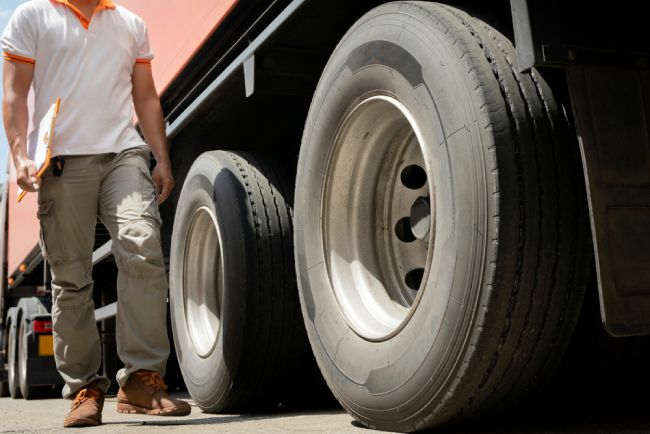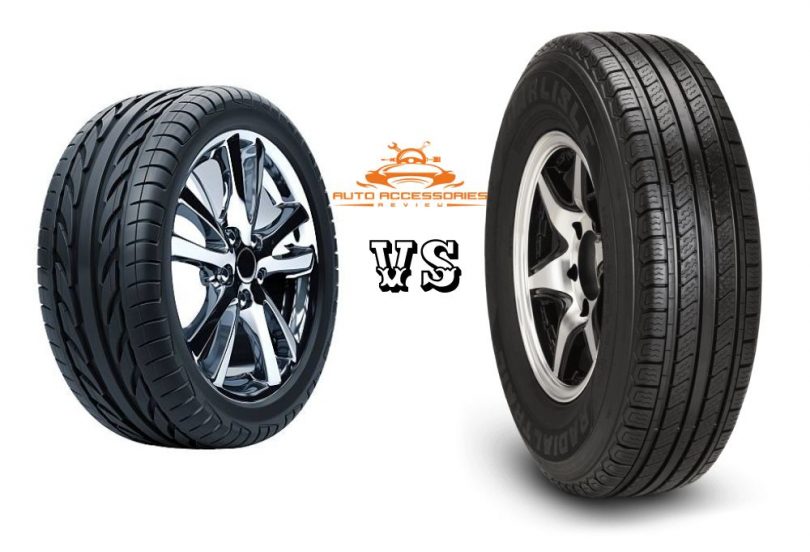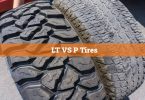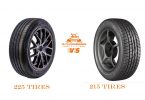Trailer or ST tires come with stiffer sidewalls than car tires to keep them from bouncing when the trailer is pulled over potholes. They also have a higher weight rating than a P or LTs tire of the same size.
Let’s dig deeper and see how exactly they differ.
Car Tires: Pros and Cons

Pros
- The sizes and capacities of automotive tires are more varied
- A wide range of weight capacities and materials are available
- Usually, ride and track better
- The footprint of automobile tires is usually larger
- Lower pressures for automotive tires mean the easier operation of machinery. It’s simple to inspect low-pressure tires
Cons
- With low-profile tires on the wheels, they are more likely to suffer damage by the road
- On snowy roads, low-profile tires are less effective in winter conditions
- Cambered wheels are also common on vehicles
Trailer Tires: Pros and Cons

Pros
- In terms of load capacity, they are superior
- The narrow form factor for the same outside trailer width results in more room between tires
- Narrower profile tires (such as trailer tires) wear better when not aligned properly
- Trailer-specific tires resist damage, abuse, and neglect better
- Due to the suspensions on automobiles, trailer tires tend to withstand more abuse
- With a high center of gravity, trailers with stronger sidewalls resist tipping more
Cons
- If your wheels are not aligned or balanced properly even underinflated, you may not notice unless they are quite bad.
- It is not as easy to find trailer tires at a moment’s notice and you can’t interchange them with your towing vehicle’s tires.
- Hard steering and slow acceleration
- Trailer tires have a broad contact patch, and the weight causes hard steering and slower acceleration.They contribute to hard steering and slow acceleration
- Quick wear
- Tires with a large size wear out more quickly with frequent use
Car Tires vs Trailer Tires: How Do They Differ?
1. Material
Car tires
Car tires consist of rubber (along with polymers) and steel. The high level of slip resistance offered by these materials depends on the variety.
Trailer tires
Trailer tires generally have a two-ply sidewall. Some can come in three-ply and each ply is different. The term “ply” refers to sheets of rubber enclosing strong threads or cords.
Winner
Trailer tires are stronger and have the advantage of the three-ply sidewalls.
2. Traction
Car tires
Car tires provide more traction than trailer tires. Such duties like steering and transmitting power to the road and swerving around obstacles. traction is important
Trailer tires
Trailer tires have a rating according to their traction on wet surfaces like asphalt. In order of rating, AA is the highest, followed by A, B, and C.
Trailer tire tread tends to be thinner, so they lack the ability to maintain traction.
Winner
Car tires win this round. They have far more traction and some are actually designed solely for traction.
3. Turning
Car tires
There are thick treads to help maintain traction on slick roadways and during sharp turns.
Trailer tires
No matter the trailer type, the trailer’s tires track inwards on the turn radius more than ar tires will.
Winner
Car tires have a better design for sharp and quick turning.
4. Creature comfort
Car tires
A supple, flexible side that protects the passengers from bumps by absorbing them.
Trailer tires
Trailer tires have stiffer sidewalls to prevent swaying.
Winner
Car tires out weight trailer tires for creature comfort. Trailer tires don’t offer much in the way of absorption.
5. Weight carrying capacity
Car tires
Tires can carry a maximum load of 2403 pounds.
Trailer tires
The tires on trailers are heavy-duty to handle the load they will be carrying. A trailer can carry 3400 pounds
The winner
A trailer can carry 997 pounds more for weight carrying.
6. Types of sidewalls
Car tires
Car tires are more flexible and not as stiff.
Trailer tires
To deal with debris and other objects, they come in contact with. Trailer tires have thicker and stronger sidewalls.
Winner
When it comes to potholes and debris, the thicker sidewalls of trailers come out on top.
7. Thread area thickness
Car tires
Car tires have approximately 8mm of tread when they are new, but it is legal to have 1.6mm of tread depth.
Trailer tires
You need 1.6 millimeters of tread depth around the circumference of the tire and central three-quarters
Winner
Trailer tires don’t need to be as thick as car tires, so the thickness level is often lower.
8. Air pressure
Car tires
Car tires on most passenger cars should have a pressure between 32 psi and 35 psi when they are cold.
Trailer tires
You can inflate trailer tires between 50 psi and 65 psi.
Winner
Trailer tires need more air pressure than car tires due to the heavy load.
9. Heat dissipation capability
Car tires
Some models contain different compounds to help with heat dissipation. particularly for cars that are in stressful situations like towing.
Trailer tires
Trailers use different compounds due to the extra heat generated during heavy use.
Winner
Extra heat is generated with trailer tires with the heavy loads they carry. As a result, they have better heat dissipation than cars.
10. Damage resistance
Car tires
Car tires are more prone to damage because they are subjected to more damage. They also wear down faster since they have thinner walls.
Trailer tires
Trailer tires suffer heat damage and sunlight if they are not used for several months. The tread on trailer tires is thicker, so they are less likely to become damaged.
Winner
Trailer tires don’t suffer as much damage as car tires and are not used as often.
11. Mileage
Car tires
Car tires usually need replacing due to wear. You can expect a minimum of 20,000 miles out of them.
Trailer tires
A trailer’s tires usually need replacing because of their age. Even though they may have plenty of treads left, trailer tires are not used as much as cars.
Winner
Trailer tires last longer when it comes to mileage as they are not used as frequently as cars. Some trailers are only used a few times a year, they never wear down fast.
12. Life expectancy
Car tires
Once your car tires are over five years old, you should have them checked annually; preferably earlier if you use your car all the time.
Trailer tires
If you drive about 15,000 to 20,000 miles a year, you will need new tires before your treads wear out. If kept out of direct sun and heat, they will last longer.
Winner
Trailer tires tend to last longer due to their non-frequent use.
13. Cost
Car tires
Car tires Premium tires cost between $200 and $300 each. Budget brands will set you back $100 to $150 each
Trailer tires
Budget tires start about 150 upwards, with premiums costing you $500 and upwards per tire.
Winner
Budget tires for both are about the same price range. However, performance car tires can set you up over $1000.
Why Is This a Bad Idea To Mix Car and Trailer Tires?
Mixing tires will give you an uneven balance on the car. For example, putting car tires on a trailer will cause unbalancing. Car tires cannot handle the weight of a trailer. Always use the same tires for the correct situation.
When to use car tires?
Car tires should only go on a car. You cannot put car tires onto a trailer. This can cause damage and lead to an accident. Their sidewalls are too flexible to serve as trailer wheels despite being flexible. As a result, they are not designed to handle heavy loads or extreme temperatures
When to use trailer tires?
Trailer tires should only go on trailers since they will create uneven balance when used on a car.
FAQs
1. Can I use trailer tires on my car?
Ans. You cannot mount a trailer tire on a car tire. The purpose of car tires is traction and comfort while the design of trailer tires is to carry loads and provide stability.
2. Do I need to balance my trailer tires?
Ans. The primary function is to support vertical loads rather than grip the ground when turning. They do not need dynamic balancing.










Leave a Comment